After 51 years of boycotting the municipal elections, the Palestinians of East Jerusalem are tired of waiting and want a new way forward. Now activists are re-thinking the best strategy to reassert their power.
By Meron Rapoport
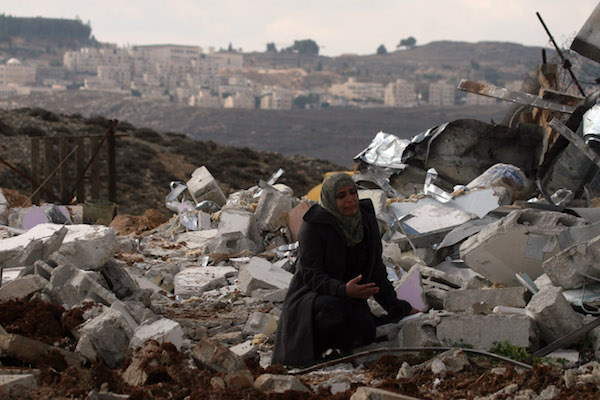
One need not be an expert on Jerusalem to recognize that only few Palestinians will participate in the upcoming municipal elections, to be held in October. Perhaps no more than a few thousands. A low voter turnout among the close to 400,000 Palestinians who live in the neighborhoods, towns, and villages that were annexed by Israel following the occupation of 1967. And yet, the sense is that something has changed. After 50 years of a near-total election boycott by Palestinians, some are now calling for a new strategy.
The most open challenge to that status quo has been posed by Gershon Baskin, a veteran left-wing Israeli activist, and Aziz Abu Sarah, a Palestinian activist and +972 writer, who announced their decision to form a new Jewish-Arab list for the upcoming elections. “Palestinians in Jerusalem have no father,” said Baskin in a recent interview. “The Palestinian Authority cannot function, in East Jerusalem people understand that the strategy of non-participation in the elections has not done them much good.” Baskin and Abu Sarah are in talks with other groups of young Palestinians in the city. Meanwhile, Ramadan Dabash, a social activist from the Sur Baher neighborhood, also announced his decision to run.
The harsh responses were almost immediate. Muhammad Hussein, the mufti of Al-Aqsa Mosque, said that participating in the elections is akin to removing oneself from “the religion, the nation, and the homeland.” Walid Salem, who runs the Palestinian Center for Democracy and Community Development, wrote a scathing article against voting, calling the idea of participating in the elections “rotten.”
Even Ziyad Abu Ziyad, the former PA Minister for Jerusalem Affairs, and one of the figures most closely associated with East Jerusalem’s political leadership, expressed reservations about the idea in an article he published in the Palestinian daily, Al Quds. Abu Ziyad wrote that this is not the first time that such an idea has come up, but that this time the phenomenon is more widespread — due both to the hardship in East Jerusalem as well as the feeling that the Palestinian Authority does not care about what happens in the city.
One can understand these feelings, Abu Ziyad wrote, but Jerusalem does not only belong to its residents — but to every Palestinian as well as the Arab world. Thus, participating in the elections means recognizing the Israeli occupation and annexation of the city. Even if Baskin and Abu Sarah’s list is elected to the city council, he adds, they will have zero influence, and will be used as a fig leaf by Israel to prove that the city is united.
During a meeting in his East Jerusalem office, Abu Ziyad emphasized that this is an “argument among friends.” There is no doubt that the Palestinian reality is grim, he says, but the problem is political — it’s not just a problem of water and services. “If we agree to participate in the elections, it means we recognize the legal authority of Israel in East Jerusalem, and the occupation. Yes, we suffer from the municipality’s treatment, from the lack of representation, from discrimination. We are resigned to suffer because of the political situation.”
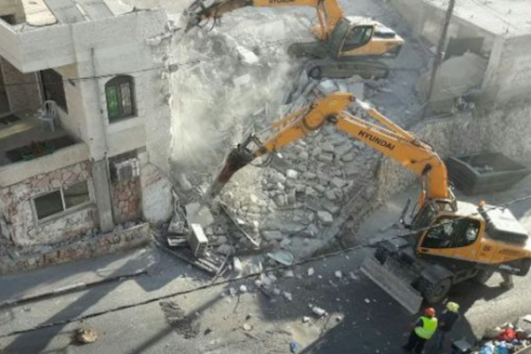
What is the solution to Palestinian suffering in Jerusalem? How can they influence their own lives?
Meron Benvenisti (former deputy mayor of Jerusalem — m.r.) previously proposed the idea of dividing Jerusalem into quarters and giving each one its own municipality. We’ll divide Jerusalem into three or more parts, and the Palestinians will elect their own city council. East Jerusalem will manage its own affairs. This can be done without changing the political situation. But right now, there is no chance for proper Palestinian representation.
Much has been written on the “Israelization” of Palestinians in Jerusalem. More young people are getting their Israeli matriculation certificates.
There is a change taking place, but it is not so significant. I hear that more Palestinians are studying in public high schools and are taking Israeli matriculation exams, but the Palestinian universities do not accept this certificate, which means they are in a bind. There is also the strengthening of relations between Arabs from East Jerusalem and Arabs in Israel, including weddings. These relations can be part of the general process of moving toward one state.
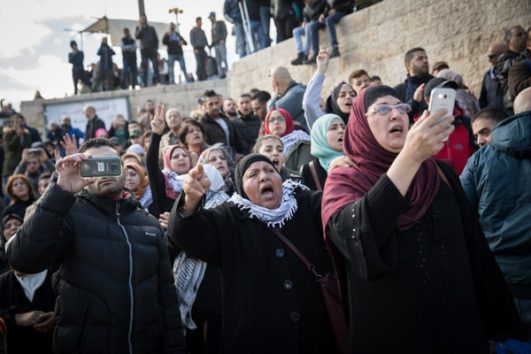
This is Abu Ziyad’s central point: moving toward one state, he believes, can also solve the problem of the Palestinians in East Jerusalem. “If there were a Palestinian decision to abandon the two-state idea and call for annexing the West Bank and for one state, then participating in the Jerusalem elections would be logical,” he says. “I personally believe that there is no chance for two states, and there is no option but to move toward one state. Yes, the interim situation will be apartheid. But this is the legal situation today anyway. But as long as this political decision has not been made, participating in the elections will be a political mistake. Israel is trying to do everything it can to turn Jerusalem into a Jewish city — not even an Israeli city.
Dr. Omar Yousef, who teaches urban studies at Al Quds University, agrees with Abu Ziyad when it comes to boycotting the elections, but he places a greater emphasis on the changes taking place in the city, especially among young people. “The historical approach of boycotting the elections has not changed,” says Yousef. “But on a personal level, people are far more easygoing about the idea of applying for an Israeli passport. They even view it as a way of resistance. I heard people in taxis saying, ‘I received an Israeli passport, and my cousin applied for one as well.’”
Yousef describes an exercise he gave to one of his classes. “I asked the students if they were willing to take an Israeli passport. We were surprised by the responses. A few students associated with Fatah said that anyone who takes an Israeli passport is a heretic. Those associated with Islamist groups said that there is no difference between their current blue IDs and Israeli citizenship. ‘If I receive Israeli citizenship, I will be able to live where I want. In the West Bank, abroad, or Jerusalem, and nobody will be able to take away my residency,’ one of the students told me.”
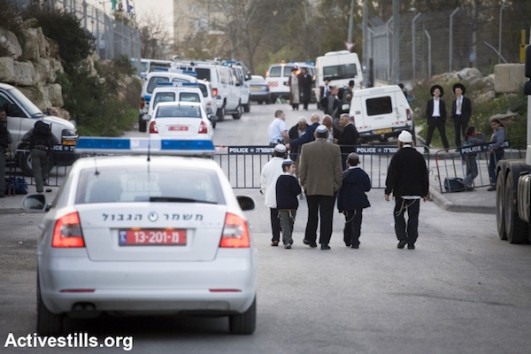
Yousef agrees with Abu Ziyad’s analysis that participation in the elections hinges on a political decision to go toward one state, “otherwise we will only serve as decoration in the city council and give legitimacy to Israeli rule.” The growing bonds with Palestinians in Israel, argues Yousef, actually decrease the desire to participate in the elections. “People say: look at the Palestinians in Israel, they participate in the elections and get nothing. So why should we participate?”
Yousef is aware of the dead end that Palestinians in Jerusalem find themselves in. “We are in a corner,” he says, “even if they demolish our school, we won’t go to the municipality, since this would mean recognizing the occupation.” His solution is that Palestinians in Jerusalem “begin taking back the city for themselves.” His proposal is not far from that of Abu Ziyad’s, just without Israeli agreement. “Let us, the Palestinians, elect a “Shadow Council” for East Jerusalem, without Israeli permission,” he says. “This is how we’ll build ourselves a structure, we’ll build good mechanisms. Maybe we’ll take care of the neighborhoods and education ourselves. This will also empower the Palestinians in Jerusalem, particularly the youth. Maybe we will be able to negotiate with Israeli institutions from a position of power. At the moment, East Jerusalemites feel like orphans.”
Attorney Elias Khoury is Palestinian citizen of Israel who has lived in Jerusalem for many years, and is heavily involved in politics within the Palestinian Authority and in East Jerusalem. He agrees that the Palestinians first need to retake control over their lives in the city. “This city belongs to whoever controls it, whoever works within it, whoever builds in it,” he says. Now, Khoury claims, the situation of Palestinians in the city is bleak. “When I look at the trash cans in the streets, it teaches about a lack of belonging,” he says sadly.
Khoury, like Abu Ziyad, opposes participating in the municipal elections because “we will just lose from it,” but agrees about the need to change strategy. “Our struggle is over how we can preserve and foster our existence,” he says. “The lack of a strategic plan, the lack of an alternative, this is the reason we are dancing in the dark.”
The Palestinians, Khoury says, must put their own policy proposal on the table. “For 50 years we have been reacting,” he says. This kind of policy proposal could be a general Palestinian decision that the Palestinians in East Jerusalem should demand Israeli citizenship. Then it would make sense to participate in the elections. But even then, he doesn’t think a joint Jewish-Arab list is a good idea. He prefers a Palestinian list that could later cooperate with Jewish forces. “Someone with wide public support would have to run, someone who knows how to bring people to the polls.”
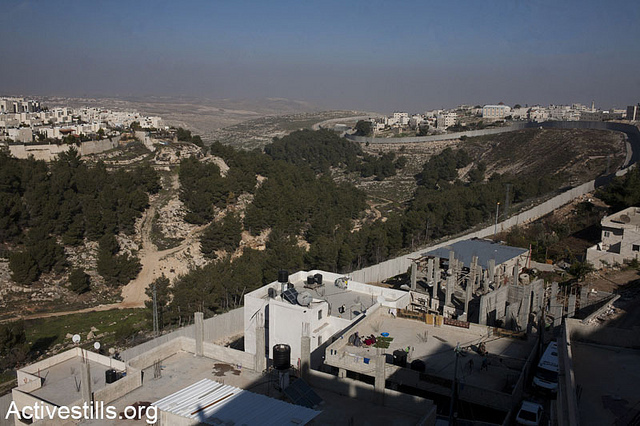
Khoury proposes challenging Israeli control over the city in other ways. “We should establish a fund that will pay Palestinians who want to buy apartments in Neve Yaakov, Pisgat Ze’ev, French Hill, and all the neighborhoods built on occupied territory,” he says, referring to East Jerusalem neighborhoods built over the Green Line. “This would probably cause terrible tension, but it would challenge the right.” In short, the worst thing to do is to sit and wait.
In the meantime, it seems that the pressure has done its work. Baskin and Abu Sarah said they were taking a “break” to think until they know where things seem to be going. There are rumors that they might join a different group of young Palestinians, which would mean the list would stop being Jewish-Arab. It is also possible that they might not run in the end. But one thing is certain: after 51 years without representation, the Palestinians of East Jerusalem are tired of waiting and want a new way forward.
Meron Rapoport is an Israeli journalist and an editor for Local Call, where this article was first published in Hebrew. Read it here.

